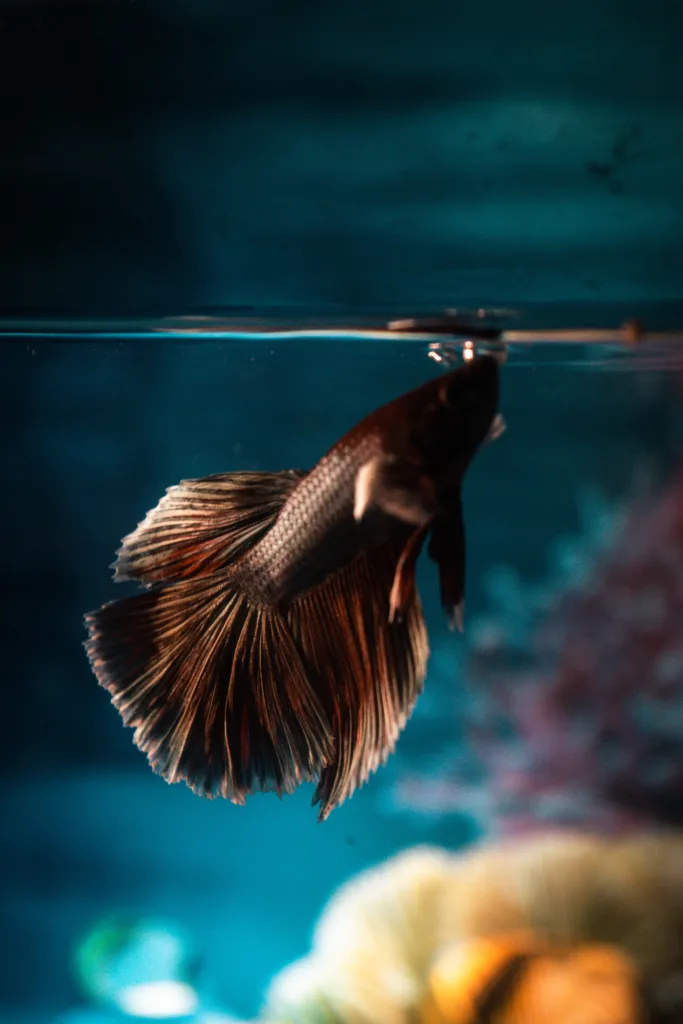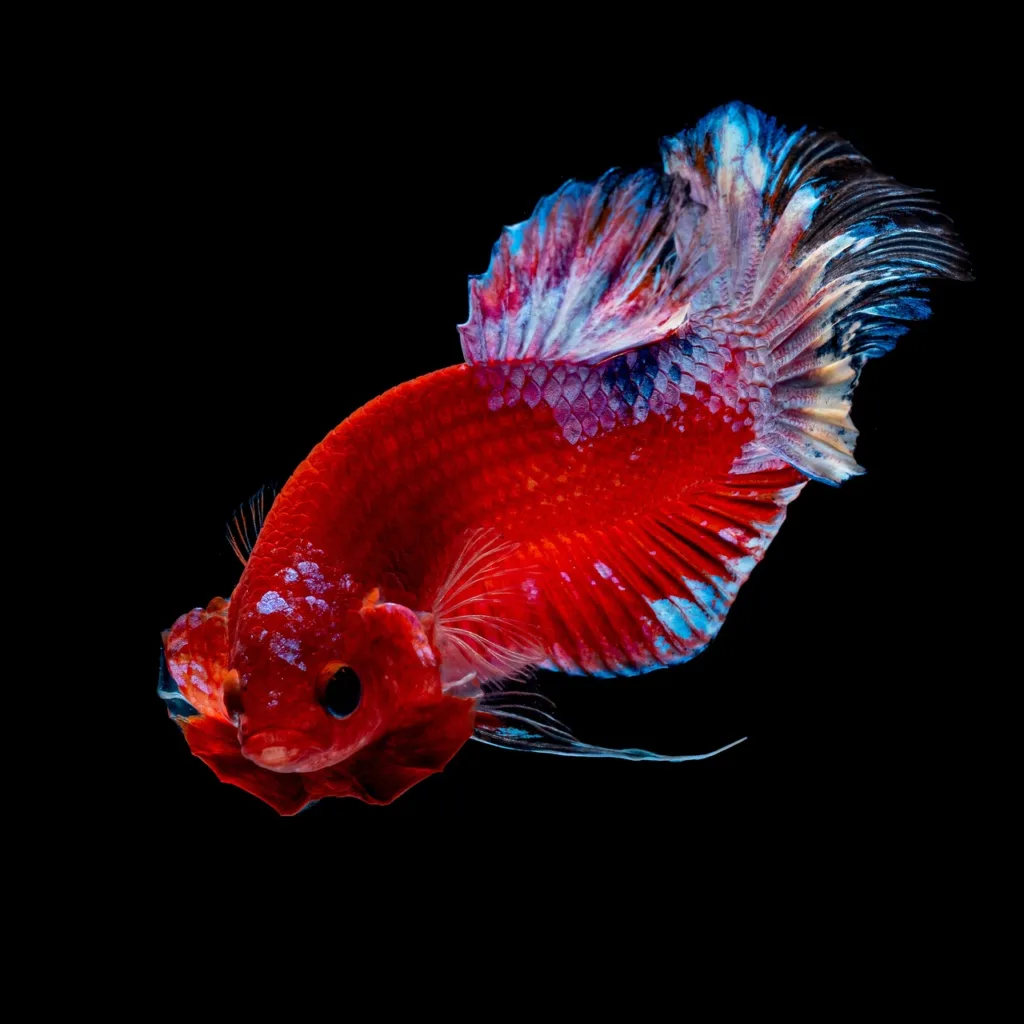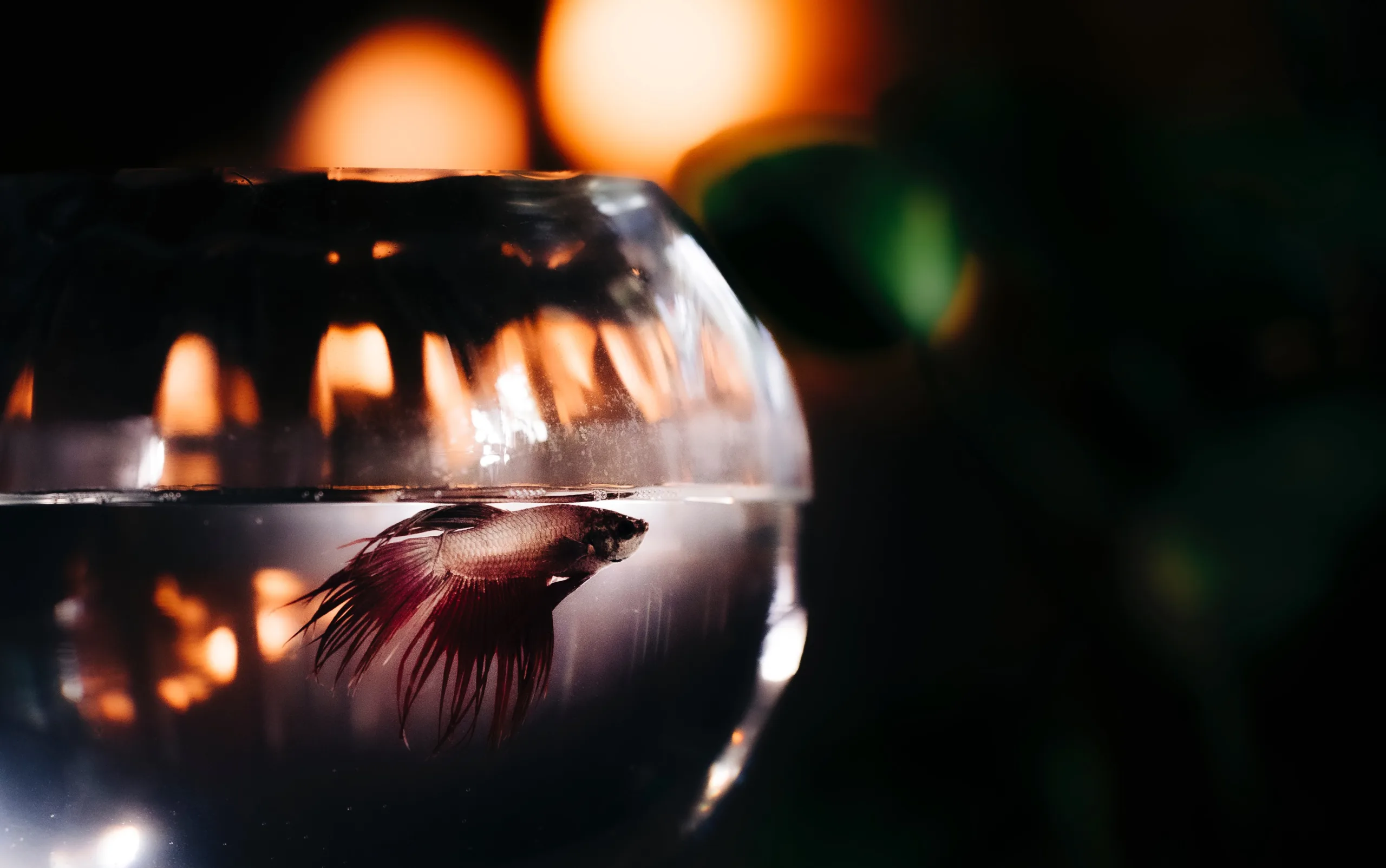Have you ever wondered about your betta fish’s night moves? I mean, can betta fish see in the dark?
It’s a curious question, especially when you notice them navigating around their tank after lights out. Stick around as we dive into the mysterious world of betta fish vision at night.
Whether you’re a seasoned betta parent or just starting out, understanding how your finned friend sees or doesn’t see in the dark can change the game to keep them happy and healthy. Let’s get into it and uncover some fishy nighttime secrets!
Do Betta Fish Like Dark?
It’s a mix, honestly. Betta fish don’t clearly prefer total darkness, but they appreciate some shaded areas within their environment. This is because, in their natural habitats, which often include rice paddies and shallow streams in Southeast Asia, they experience various lighting conditions. They get natural sunlight but also plenty of shadows cast by vegetation.
Why a Little Darkness is Good
Having some darker spots within their tank is crucial for a couple of reasons:
- Stress Reduction: Like us needing a break from the bustling world, bettas need quiet, less brightly lit spaces to feel secure and reduce stress. Too much exposure to bright lights can make them feel exposed and anxious.
- Hiding Spots: Bettas are territorial and occasionally retreat to darker spots to feel safe or when they want to be alone. This can be particularly important in community tanks where bettas share space with other fish.
But Not Too Dark.
However, while bettas appreciate some darkness, a tank that’s consistently too dark isn’t ideal. Bettas are diurnal, which means they are active during the day and rest at night. They rely on a regular daylight cycle to maintain their natural behavior and health.
Creating the Ideal Environment
To strike the right balance, you can:
- Use dimmable lights: These can simulate sunrise and sunset, giving your betta a more natural experience.
- Provide floating plants or decorations: These can create naturalistic shadows and give your betta comforting hideaways without making the tank too dark.
- Monitor the light: Ensure a good cycle of light and dark in the tank, mimicking natural day and night to help regulate your betta’s internal clock.
Can Betta Fish See In The Dark?
Let’s investigate the burning question: do betta fish see in the dark? While they aren’t exactly equipped with night vision, they do have some capability to perceive their surroundings when the lights go out. Here’s how it works.
Understanding Betta Vision
Betta fish have eyesight adapted to their natural habitats, which are generally shallow and can vary in clarity and light availability. Their vision is structured to be effective under low light conditions, but it’s different from seeing in the dark.
- Eye Anatomy: Bettas have a decent amount of rod cells in their eyes, which are sensitive to light and movement. These cells help them detect shapes and movements in dim light but don’t provide sharp images or rich color vision in darkness.
- Limited Night Vision: In complete darkness, bettas aren’t blind, but their ability to see is significantly reduced. They can likely detect variations in light intensity and movement, which helps them avoid running into objects or detecting potential threats or food.
How Bettas Navigate in the Dark
Since their vision is limited in the dark, bettas rely on other senses to navigate their environment:
- Lateral Line System: This is a key sensory organ in fish, including bettas, that detects water currents and vibrations. It allows bettas to sense the presence of objects and other creatures without seeing them visually.
- Tactile Sensation: Bettas can use their fins to feel their surroundings, helping them avoid obstacles and explore their environment in low light or murky conditions.
What This Means for Betta Care
Knowing that bettas have some level of night vision but rely heavily on other senses in the dark, here are a couple of tips for tank management:
- Avoid Sudden Changes in Lighting: Avoid abrupt transitions from bright to dark to prevent stress or disorientation. Consider using ambient lighting that mimics natural sunsets and sunrises.
- Provide a Safe Environment: Since bettas can see to some extent in the dark but not clearly, ensure their tank doesn’t have sharp or harmful objects they could accidentally bump into.
So, while bettas can’t see clearly in the dark, they are not entirely helpless. They have adapted beautifully to their environments, blending limited vision and other senses to navigate their watery world when the lights go off. This blend of sensory inputs helps them thrive in conditions challenging for different fish species.

Do Betta Fish Need Darkness to Sleep?
Like us, betta fish have a daily rhythm and require periods of light and darkness to maintain their health and well-being. Ensuring a proper light-dark cycle is crucial for their sleep and overall health.
The Importance of Darkness for Sleep
Bettas, being diurnal creatures, are active during the day and rest at night. Here’s how darkness plays a role in their sleep:
- Mimicking Natural Conditions: In the wild, the natural cycle of day and night regulates a betta’s internal clock. Providing darkness at night helps simulate these natural conditions in your aquarium, promoting healthier sleep patterns.
- Triggering Sleep Behavior: Darkness signals to betta fish that it’s time to slow down and rest. This rest is vital as it helps them conserve energy and reduce stress. Without a distinct period of darkness, bettas can become stressed or disoriented.
- Rest and Recovery: Sleep allows bettas to recover from the day’s activities. During sleep, their bodies can repair tissues and process information and memories, which is crucial for their nervous system health.
Creating Ideal Sleeping Conditions
To provide an environment conducive to good sleep for your betta fish, consider the following:
- Consistent Light Schedule: Maintain a consistent schedule of light and darkness. Typically, 14 – 16 hours of light followed by darkness for the rest of the hours, which mimics their natural habitat well.
- Gradual Lighting Changes: Use timers or adjustable lighting systems to gradually increase and decrease the light in the tank, simulating sunrise and sunset. This helps prevent sudden changes that can stress your fish.
- Provide Hiding Spots: Add plants and decorations to create shady spots in the tank. These help bettas find cozy places to rest, both day and night.
Betta fish require periods of darkness to sleep well. Establishing a regular cycle of light and dark in your aquarium supports their sleeping habits and maintains their overall circadian rhythm, which is essential for their health and well-being. By mimicking the natural light conditions of their habitat as closely as possible, you can help ensure that your betta lives a long, healthy, and happy life.
How Do Betta Fish Behave in Darkness?
When the lights go out, betta fish behavior can change significantly. Understanding these changes can help you ensure their environment is comfortable and stress-free, even at night.
1. Reduced Activity: Typically, bettas will slow down and exhibit less swimming activity in darkness. This is part of their natural rest period, and you might find them hovering in one spot or resting near the bottom or on plant leaves.
2. Dependence on Other Senses: When it’s dark, and their vision is limited, bettas depend more on their lateral line system to sense movements and vibrations in the water. This heightened sensitivity helps them navigate their environment and be aware of any potential dangers or food sources nearby.
3. Increased Alertness to Disturbances: While bettas reduce their physical activity in the dark, they might become more responsive to sudden disturbances. This could be anything from a tap on the tank glass to changes in water flow, as their other senses take over to compensate for the lack of visual input.
4. Seeking Shelter: In darkness, bettas often seek out sheltered resting spots. This behavior mimics their natural instinct to hide from predators and environmental threats when visibility is low.

Can Too Much Darkness Be Harmful to Betta Fish?
While a proper cycle of light and darkness is essential for health, too much darkness can harm betta fish.
1. Disrupted Circadian Rhythm: Just as too little darkness can stress betta fish, excessive darkness can disrupt their internal biological clock. This disruption can lead to behavioral changes, decreased immunity, and reduced overall vitality.
2. Stress and Anxiety: Extended periods of darkness can cause stress and anxiety in bettas. They might become more skittish, and their eating patterns could be disrupted, affecting their health.
3. Hindered Growth and Health: Adequate lighting influences various biological functions, including growth and the synthesis of vitamins. For instance, light helps synthesize vitamin D, crucial for healthy bone development and metabolic processes.
4. Impact on Plant Life: If you have live plants in your betta tank, too much darkness can also affect their health and ability to photosynthesize. This, in turn, affects the overall quality of the water, potentially leading to poorer water conditions for your fish.
Recommendations for Light Management
To avoid the negative impacts of too much darkness, it’s advisable to:
- Maintain a Balanced Light Cycle: Aim for about 14 – 16 hours of light and the rest of darkness. This cycle best supports betta fish’s natural activity and rest periods.
- Use Timers for Consistency: Automatic timers for your tank’s lighting can help maintain a consistent light-dark cycle without manual intervention.
- Monitor Your Betta’s Behavior: Keep an eye on how your betta behaves in response to changes in lighting. Adjustments might be needed if you notice signs of stress or discomfort.
Conclusion
In conclusion, while betta fish need periods of darkness to mimic their natural sleep patterns, it’s essential to strike the right balance between light and dark in their environment. Maintaining a consistent light-dark cycle supports their natural behaviors and improves their overall health and well-being. By closely mimicking the natural conditions of their habitat and monitoring their responses to changes in lighting, you can ensure that your betta fish leads a happy, healthy life in your care. Remember, a well-lit day and a peaceful night are crucial to keeping your colorful companion thriving.
